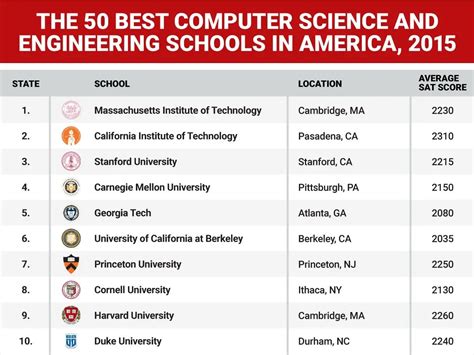As technology continues to evolve at a rapid pace, the demand for skilled computer science professionals is on the rise. With so many advancements and changes in the field, it’s crucial for aspiring computer scientists to stay updated on the latest trends and opportunities within the industry. In this blog post, we’ll be exploring the future of tech through the lens of computer science programs at universities in the United States. From top-ranked programs to emerging fields and research opportunities, we’ll cover a wide range of topics to give you a comprehensive understanding of what the future of computer science education holds. Additionally, we’ll delve into the implications of AI and machine learning in computer science programs, industry partnerships, and job placement, as well as diversity and inclusion initiatives within these academic settings. Whether you’re a prospective student, current student, or a professional looking to advance your skills, this post will serve as an informative guide to the exciting world of computer science education.
Table of Contents
Top-ranked computer science programs in the US
When it comes to pursuing a degree in computer science, it’s essential to choose a program that will provide a top-notch education and set you up for success in the industry. Fortunately, the United States is home to some of the best computer science programs in the world, offering cutting-edge research opportunities, state-of-the-art facilities, and renowned faculty members.
One of the top-ranked computer science programs in the US is the Massachusetts Institute of Technology (MIT), which consistently ranks at the top of national and global university rankings. With its strong emphasis on hands-on learning and interdisciplinary research, MIT provides students with a comprehensive education that prepares them for a wide range of career opportunities in the field.
Stanford University is another top contender, known for its innovative approach to computer science education and its close ties to Silicon Valley. With access to leading tech companies and a diverse range of research opportunities, Stanford’s computer science program equips students with the skills and knowledge they need to thrive in the rapidly evolving tech industry.
Other top-ranked programs in the US include Harvard University, California Institute of Technology (Caltech), and Carnegie Mellon University, all of which offer rigorous curriculums, extensive resources, and strong professional networks to help students succeed in their careers.
Trends in computer science education
Computer science education is constantly evolving to keep up with the rapid advancements in technology. One of the major trends in computer science education is the increasing emphasis on coding skills. Many universities and colleges are integrating coding into their curriculums starting from the elementary level, recognizing the importance of this skill in the digital age.
Another trend is the shift towards interdisciplinary learning. With the integration of technology in various fields, there is a growing demand for computer science professionals who can work across disciplines. As a result, computer science education is incorporating elements of fields such as biology, healthcare, and environmental science.
Project-based learning has also become a popular trend in computer science education. This approach allows students to apply theoretical knowledge to real-world problems, enhancing their problem-solving and critical thinking skills. Many institutions are incorporating project-based learning into their computer science programs to better prepare students for the workforce.
Lastly, online learning has become an integral part of computer science education. With the advancements in technology, online platforms offer a wide range of computer science courses, making education more accessible to individuals around the world. This trend has also led to the development of virtual labs and collaborative tools that enhance the learning experience for computer science students.
Emerging fields in computer science
As technology continues to advance, new emerging fields in computer science are constantly evolving. One such field is artificial intelligence (AI), which is becoming increasingly integrated into various aspects of society, from healthcare to autonomous vehicles. AI involves creating intelligent machines that can perform tasks that typically require human intelligence, and it is at the forefront of innovation in computer science.
Another emerging field is cybersecurity, as the threat of cyber attacks becomes more prevalent in our digital world. Computer scientists are now focusing on creating advanced security measures to protect sensitive information and systems from potential breaches. The demand for cybersecurity experts is on the rise, making it a promising field for those entering the computer science industry.
Additionally, data science is a rapidly growing area within computer science, as companies and organizations seek to leverage big data for decision-making and strategic planning. Data scientists are tasked with analyzing large datasets to uncover valuable insights and trends, making it a crucial field in today’s data-driven world.
Blockchain technology is also an emerging field that is revolutionizing the way transactions are conducted and recorded. Computer scientists are exploring the potential applications of blockchain in various industries, including finance, supply chain management, and healthcare, making it an exciting area for innovation and exploration.
Research opportunities for computer science students
Computer science students have an array of research opportunities available to them during their academic journey. These opportunities can range from conducting independent research projects to collaborating with professors on cutting-edge studies.
One avenue for research opportunities is through university research labs. Many top-ranked computer science programs offer specialized labs where students can engage in hands-on research in areas such as artificial intelligence, cybersecurity, and data science.
In addition to university labs, students can also apply for internships at tech companies or research institutions. These internships provide valuable real-world experience and the chance to work on impactful projects alongside industry professionals.
Furthermore, students can seek out faculty mentorship to guide them in finding research opportunities that align with their interests and career goals. Professors can provide valuable insight and support as students navigate the world of academic research.
Internship programs offered by universities
Internship programs offered by universities are a valuable opportunity for students to gain real-world experience in their field of study. These programs provide students with the chance to apply their knowledge and skills in a professional setting, while also giving them the chance to network and build connections in their industry.
Universities often partner with local businesses and organizations to provide internship opportunities for their students. This collaboration allows students to work on meaningful projects and gain hands-on experience that will benefit them in their future careers.
Internship programs offered by universities also benefit the companies that participate by providing them with access to talented and motivated students who bring fresh perspectives and innovative ideas to their organization. These programs can also serve as a pipeline for recruiting top talent, as many companies offer full-time employment to their interns upon graduation.
Overall, internship programs offered by universities are a win-win for both students and employers, providing valuable experience and opportunities for growth.
Collaborations between universities and tech companies
In recent years, collaborations between universities and tech companies have become increasingly common. These partnerships offer a wide range of benefits for both parties involved. Universities gain access to the latest technologies and industry expertise, while tech companies can tap into the fresh talent and innovative research being conducted at academic institutions.
One of the most significant aspects of these collaborations is the opportunity for students to gain real-world experience through internships, co-op programs, and research projects. This not only enriches their academic experience but also provides valuable networking and career opportunities in the tech industry.
Furthermore, these partnerships often lead to joint research initiatives, allowing universities and tech companies to work together on cutting-edge projects that have the potential to make a significant impact in the field of computer science. This can result in groundbreaking discoveries and advancements that benefit society as a whole.
Overall, collaborations between universities and tech companies play a crucial role in bridging the gap between academia and industry, driving innovation, and preparing the next generation of computer science professionals for success in the rapidly evolving tech sector.
Campus resources for computer science students
One of the benefits of studying computer science at a university is access to a wide range of campus resources that can support students in their academic and career pursuits. From specialized labs equipped with the latest technology to dedicated mentoring programs for aspiring computer scientists, universities provide a wealth of resources to help students thrive in their studies and prepare for the workforce.
For computer science students, access to programming and software development labs is crucial for gaining practical experience and honing their skills. Many universities offer state-of-the-art computer labs equipped with industry-standard software and hardware, providing students with a conducive environment for coding and experimenting with different technologies.
Besides technical resources, universities also provide support for students’ academic and professional development. This includes academic advising services, career counseling programs, and access to internship and job placement opportunities within the tech industry. These resources are instrumental in helping computer science students navigate their academic journey and prepare for successful careers after graduation.
Furthermore, many universities offer student organizations and clubs specifically tailored for computer science students. These clubs provide a platform for students to network with peers, engage in coding competitions, and collaborate on tech projects. They also serve as a support system for students, fostering a sense of community and camaraderie within the computer science department.
Diversity and inclusion in computer science programs
One of the most important aspects of a successful computer science program is diversity and inclusion. It is crucial for the field of computer science to embrace diversity and ensure that individuals from all backgrounds have the opportunity to pursue a career in this rapidly growing field.
Universities and colleges are recognizing the importance of diversity in computer science programs and are taking steps to ensure a more inclusive environment. This includes efforts to recruit and retain underrepresented groups such as women, minorities, and individuals from low-income backgrounds.
Initiatives such as outreach programs, scholarships, and mentorship opportunities are being implemented to encourage diversity and inclusion in computer science education. By creating a supportive and inclusive environment, universities can help bridge the gap and create a more diverse workforce in the tech industry.
Furthermore, diversity in computer science programs leads to a variety of perspectives and ideas, which is essential for driving innovation and problem-solving in the field. Embracing diversity and inclusion in computer science programs not only benefits individual students but also contributes to the advancement of the entire industry.
Industry partnerships and job placement
In today’s competitive job market, it is important for universities to establish industry partnerships in order to provide job placement opportunities for their computer science students. These partnerships can take many forms, ranging from internships and co-op programs to research collaborations and sponsored projects.
By partnering with tech companies and other industry leaders, universities can ensure that their graduates are well-prepared for the workforce. These partnerships also provide students with valuable networking opportunities and real-world experience, making them more attractive to potential employers.
Furthermore, industry partnerships can lead to enhanced curriculum development, as companies provide input on the skills and knowledge that are most in-demand in the field. This ensures that graduates are equipped with the latest technological advancements and are ready to make an immediate impact in the industry.
Overall, industry partnerships play a crucial role in the job placement of computer science students, providing them with the skills, connections, and opportunities they need to succeed in today’s competitive job market.
Implications of AI and machine learning in computer science programs
Artificial Intelligence (AI) and machine learning have become integral parts of computer science programs in colleges and universities across the world. These technologies are revolutionizing the way computer science is taught and studied, and their implications are far-reaching.
One of the most significant implications of AI and machine learning in computer science programs is the need for updated curriculum and course offerings. As these technologies continue to evolve at a rapid pace, educators must constantly adapt their teaching materials and methods to keep up with the latest developments.
Furthermore, AI and machine learning are creating new opportunities for research and innovation in computer science. Students and faculty members are exploring applications of these technologies in areas such as robotics, natural language processing, and computer vision, leading to groundbreaking discoveries and advancements.
Lastly, the rise of AI and machine learning in computer science programs is also impacting the job market. Graduates with expertise in these areas are in high demand, as companies seek to harness the power of AI and machine learning to improve processes and develop innovative products and services.






